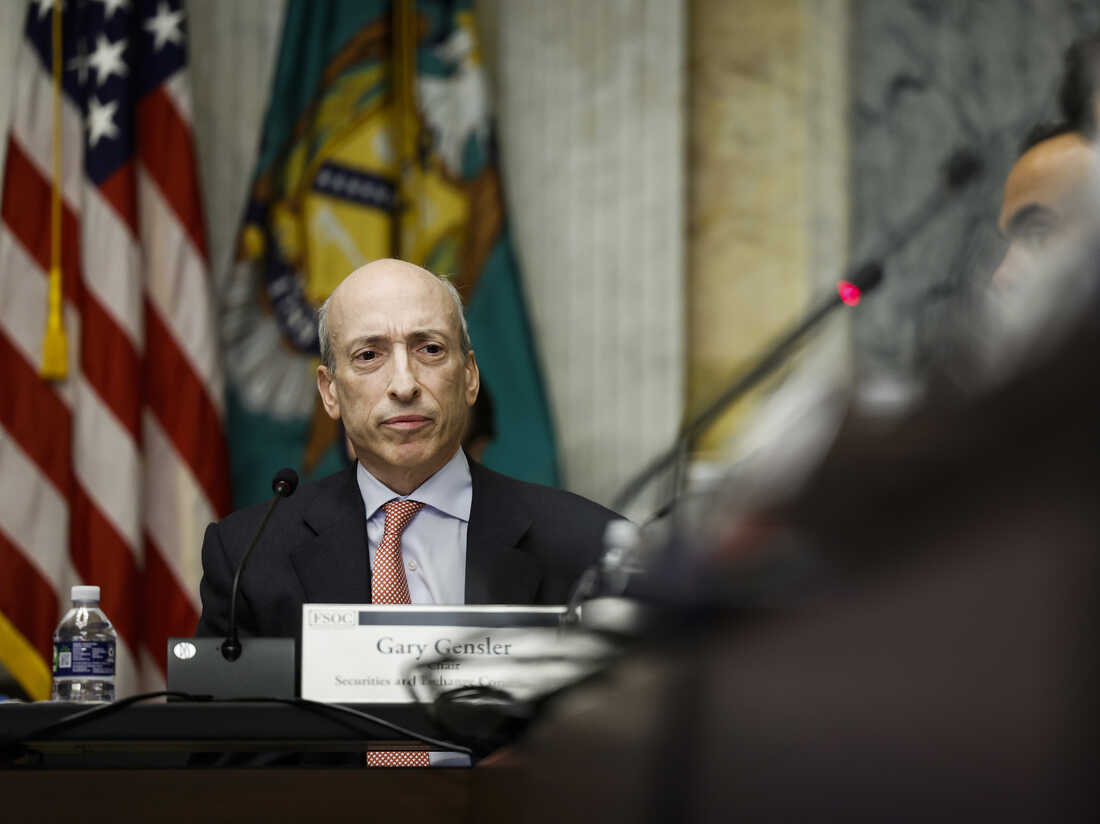Why the SEC is going after crypto exchanges Coinbase and Binance : NPR

Securities and Exchange Commission Chair Gary Gensler listens during a meeting of top financial regulators at the U.S. Treasury Department on Oct. 3, 2022, in Washington, D.C. The SEC’s lawsuit against crypto exchanges Binance and Coinbase this week are intended to bring both under the regulatory purview of the agency.
Anna Moneymaker/Getty Images
hide caption
toggle caption
Anna Moneymaker/Getty Images

Securities and Exchange Commission Chair Gary Gensler listens during a meeting of top financial regulators at the U.S. Treasury Department on Oct. 3, 2022, in Washington, D.C. The SEC’s lawsuit against crypto exchanges Binance and Coinbase this week are intended to bring both under the regulatory purview of the agency.
Anna Moneymaker/Getty Images
Since Gary Gensler became Wall Street’s top cop two years ago, his message to cryptocurrency companies has been consistent: He would do all it takes to tame a world he likens to “the Wild West.”
This week, he delivered on that threat, big time.
The Securities and Exchange Commission unveiled a barrage of charges against two of the world’s largest crypto exchanges — Coinbase and Binance — kicking off a legal battle that will help define the future of cryptocurrencies.
Here’s what to know about the fight, and why it’s so important.
What are these two cases about?
They stand to answer a critical question: Who gets to police crypto companies?
Although Binance and Coinbase may not be household names, they are well known in the world of crypto. Billions of dollars worth of digital assets change hands on these platforms every day, and they have customers all over the world.
Yet crypto, since its beginnings, has existed in a regulatory gray area. After all, most of the current finance rules were set before cryptocurrencies came into being.
A turf war continues, between the SEC and another federal regulator, the Commodity Futures Trading Commission (CFTC), over which agency has the power to oversee these assets and the broader sector.
Gensler believes most cryptocurrencies are securities, and as such, current laws give his agency the power to regulate them, and the sites and apps on which they are bought and sold.
Although these two lawsuits are different in many ways, at their heart, Coinbase and Binance are both being accused of failing to register their exchanges with the SEC.

Binance founder and CEO Changpeng Zhao poses during an interview at a technology startups and innovation fair in Paris on May 16, 2022. Binance and Zhao face a barrage of lawsuits from the SEC.
Eric Piermont/AFP via Getty Images
hide caption
toggle caption
Eric Piermont/AFP via Getty Images

Binance founder and CEO Changpeng Zhao poses during an interview at a technology startups and innovation fair in Paris on May 16, 2022. Binance and Zhao face a barrage of lawsuits from the SEC.
Eric Piermont/AFP via Getty Images
That’s something that crypto companies have fought tooth and nail. By design, crypto is supposed to operate outside of the traditional financial system.
What many crypto companies want are new rules of the road that are crypto-specific.
If the SEC prevails in the courts, it could potentially force crypto companies to register with the SEC, which would be a sea change.
“I think these cases will be fundamental to the shape of crypto regulation,” says Timothy Massad, who is the former chairman of the CFTC.
So what happens now?
In many ways, this is an existential fight for these companies.
Binance, perhaps, faces the most serious allegations, including that the exchange and its CEO, Changpeng Zhao misled investors about the exchange’s ability to detect market manipulation, and it misused customer funds.
…
Read More: Why the SEC is going after crypto exchanges Coinbase and Binance : NPR


